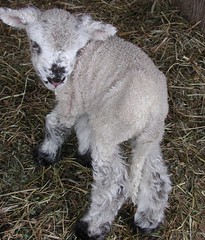 One week before the start of the lambing season, 90 ewes were vaccinated with 1 ml of TSV-2®, a modified live bovine rhinotracheitis-parainfluenza3 vaccine, administered intranasally. Alternate litters of lambs within vaccinated (149 lambs) and control (137 lambs) ewe groups received 0.5 ml of TSV-2®. Death and treatment data through 66 days of age were analyzed.
One week before the start of the lambing season, 90 ewes were vaccinated with 1 ml of TSV-2®, a modified live bovine rhinotracheitis-parainfluenza3 vaccine, administered intranasally. Alternate litters of lambs within vaccinated (149 lambs) and control (137 lambs) ewe groups received 0.5 ml of TSV-2®. Death and treatment data through 66 days of age were analyzed.Total deaths of lambs born alive were fewer and deaths due to pneumonia or unknown causes were fewer in the vaccinated than in the control groups, although the effect of vaccination was not statistically significant.
Through 66 days of age when the first lamb was sold, only 10 lambs, or 3.5% of those born alive, died of pneumonia with about equal proportions in the four ewe and lamb vaccination groups. Through 220 days of age, more control lambs died, but the survival analysis found no statistically significant differences among vaccination groups in total death loss nor in the proportion treated, dying, or both due to pneumonia.
Although overall deaths were non-significantly higher in control lambs, vaccination against PI3 did not appear to reduce the incidence of pneumonia in this flock.
Read full article in Small Ruminant Research, January 2008
